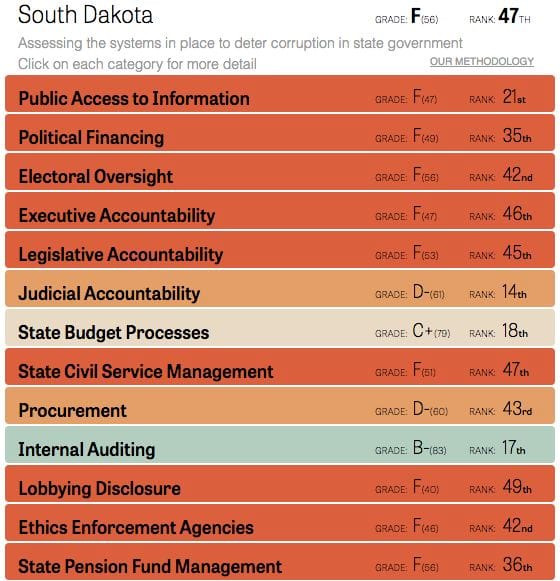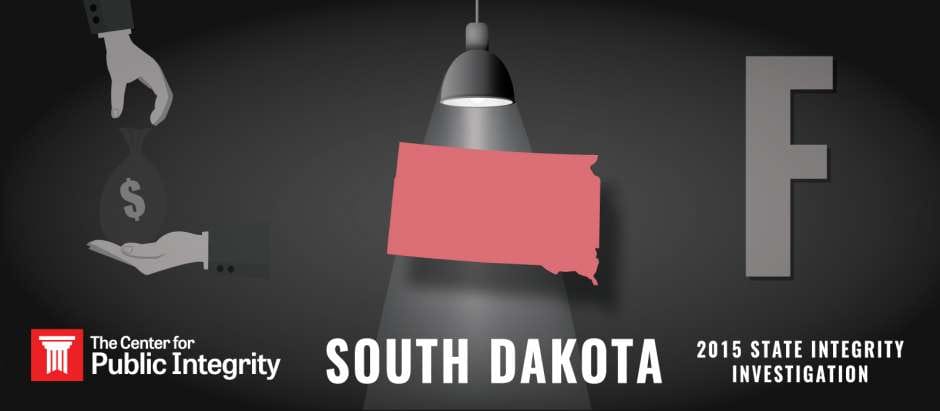Swamp Things: South Dakota Gets "F" in Ethics

Where does your state rank for integrity?
South Dakota Senate is currently considering a repeal to the Government Accountability and Anti-Corruption Act (Measure 22, IM-22), approved by voters in 2016. HB 1069, already passed by the state House, would completely kill IM-22 without any further say from voters.
Expected to vote on the measure Thursday, the South Dakota Senate delayed the vote until Wednesday.
READ MORE: Swamp Bites Back: S.D. Lawmakers Declare “Emergency” to Overturn Anti-Corruption Act
State lawmakers assert that voters were tricked into voting for a measure that limited campaign finance and lobbying access, and created an independent ethics commission -- something South Dakota has not had in a long time.
Just days after the 2016 election, a judge paused implementation of IM-22 at the behest of Republican lawmakers, but the judge added that there were some provisions of the measure that could be "saved."
Legislators, however, wanted it scrapped completely. So, this week, they declared a state of emergency to overturn the provisions of the measure, a tactic that would prevent voters from being able to respond through referendum.
According to the Washington Post, one South Dakota legislator, Rep. Larry Rhoden, claims the state doesn't need such immediate ethics reform.
“We are pretty squeaky clean, and I can say that with a great deal of pride in South Dakota; the ethics among the people that serve the state in the legislature, I would call impeccable," he said.
Impeccable is a strong word; especially, when one looks at the state's record.
The Center for Public Integrity (CPI) gave South Dakota an 'F' in 2015 -- and in 2012 -- on its Corruption Risk Report Card. In 2015, the state ranked 47th. In "Legislative Accountability" specifically, it ranked 45th.

"The state’s weak lobbying disclosure is among the reasons why South Dakota received an overall grade of F, or a numerical score of 56 out of 100, in the State Integrity Investigation, a data-driven assessment of government transparency and accountability by the Center for Public Integrity and Global Integrity. South Dakota suffered failing grades in nine of the investigation’s 13 categories, including lobbying disclosure, ranking it 47th in the nation overall," CPI states.
Read the CPI's complete findings for 2015 and 2012.

IM-22 established an independent ethics commission to enforce the act's provisions and maintain a publicly financed program for campaigns that were willing to comply with limitations to contributions and expenditures. South Dakota has not had an ethics commission of any kind since 1979.
There have been a couple of attempts to create a new ethics commission, at a broader scale than IM-22 would cover. All have failed.

In October 2013, a scandal emerged over inappropriate use of federal funding for the EB-5 visa program, in place to help foreigners who are willing to invest at least half a million dollars in job creating programs in the U.S.
According to the Rapid City Journal, mismanagement of the funds "included, among other things, the diversion of at least $1.7 million of investors’ money to a offshore holding company in Cyprus; the diversion of more than $3 million for unapproved expenses; and the diversion of more than $12 million to initially service debt underwritten by a lending company in the British Virgin Islands and then to buy that same lending company."
The U.S. Citizenship and Immigration Services no longer trusts South Dakota with the EB-5 program.
https://twitter.com/RCJournal/status/758678851723689984
Capital Journal reported in 2015 that there were still a lot of questions surrounding EB-5 and another scandal involving a program called GEAR UP, most important of them: "How is it that some South Dakotans in recent years have felt so comfortable misusing millions, thinking that they will not get caught?"
The Capital Journal writes:
"Conservative South Dakota likes to grouse about federal overreach and over-regulation. But South Dakota, starting during the Republican administration of former Gov. Mike Rounds, offers a compelling argument that what was needed here was more federal regulation and oversight, not less. What we had here was shoddy government. The state and its partners did a lousy job managing two programs, and people were tempted into wrongdoing because they knew oversight was lax."
"Across the board, the state lacks robust laws to prevent corruption, apparently the result of a sense, at least among South Dakota’s ruling class, that burdensome controls are not needed in a rural state with a supposedly high degree of familiarity, trust and cordiality," the Center for Public Integrity also notes.
The lack of effective oversight does not point to implicit corruption within the legislature. However, the EB-5 and GEAR UP cases alone refute the claim that everything is "squeaky clean" in South Dakota.
State lawmakers claim that there are currently 4 bills in the legislature that can replace IM-22 and still honor the will of the people: HB1076, which would create a State Government Accountability Board, HB1073, which would prohibit public officials and members of their immediate family from accepting gifts from lobbyists exceeding $100, SB53, which would create a campaign finance ethics commission, and SB54, which puts in place laxer campaign finance restrictions.
How voters respond to these replacements to IM-22 remains to be seen.
Chart From The Center For Public Integrity





